Arctic ice cap to disappear in 20-30 years: study

The Arctic ice cap will vanish completely in summer months within 20-30 years, polar researchers said Thursday, sounding the alarm two months before a critical climate change summit in Copenhagen.
It is likely to be largely ice-free during the warmer months within a decade, according to findings from an arctic expedition led by British adventurer Pen Hadow.
Veteran polar explorer Hadow and two other Britons went out on the Arctic ice cap for 73 days during the northern spring, taking more than 6,000 measurements and observations of the sea ice.
The raw data they collected from March to May has been analysed, producing some stark predictions about the state of the ice cap.
"The summer ice cover will completely vanish in 20 to 30 years but in less than that it will have considerably retreated," said Professor Peter Wadhams, head of the polar ocean physics group at Britain's Cambridge University.
"In about 10 years, the Arctic ice will be considered as open sea."
Starting off from northern Canada, Hadow, Martin Hartley and Ann Daniels skied over the ice cap to measure the thickness of the remaining ice, assessing its density and the depth of overlying snow, as well as taking weather and sea temperature readings.
Across their 450-kilometre (290 mile) route, the average thickness of the ice floes was 1.8 metres (six feet), while it was 4.8 metres when incorporating the compressed ridges of ice.
"An average thickness of 1.8 metres is typical of first year ice, which is more vulnerable in the summer. And the multi-year ice is shrinking back more rapidly," said Wadhams.
"It's a concrete example of global change in action.
"With a larger part of the region now in first year ice, it is clearly more vulnerable. The area is now more likely to become open water each summer, bringing forward the potential date when the summer sea ice will be completely gone."
Dr. Martin Sommerkorn, senior climate change adviser for the World Wide Fund for Nature's international Arctic programme, said the survey painted a sombre picture of the ice meltdown, which was happening "faster than we thought".
"Remove the Arctic ice cap and we are left with a very different and much warmer world," he said.
Loss of sea ice cover will "set in motion powerful climate feedbacks which will have an impact far beyond the Arctic itself," he added.
"This could lead to flooding affecting one quarter of the world's population, substantial increases in greenhouse gas emission from massive carbon pools and extreme global weather changes.
"Today's findings provide yet another urgent call for action to world leaders ahead of the United Nations climate summit in Copenhagen in December to rapidly and effectively curb global greenhouse gas emissions."
British energy and climate change minister Ed Miliband said the report "sets out the stark realities of a rapidly changing climate and illustrates the risk of an ice free summer in the Arctic in the not-too-distant future".
"This further strengthens the case for an ambitious global deal in Copenhagen in December which the UK is fully committed to achieving," he added.
Subscribe to Independent Premium to bookmark this article
Want to bookmark your favourite articles and stories to read or reference later? Start your Independent Premium subscription today.

Join our commenting forum
Join thought-provoking conversations, follow other Independent readers and see their replies